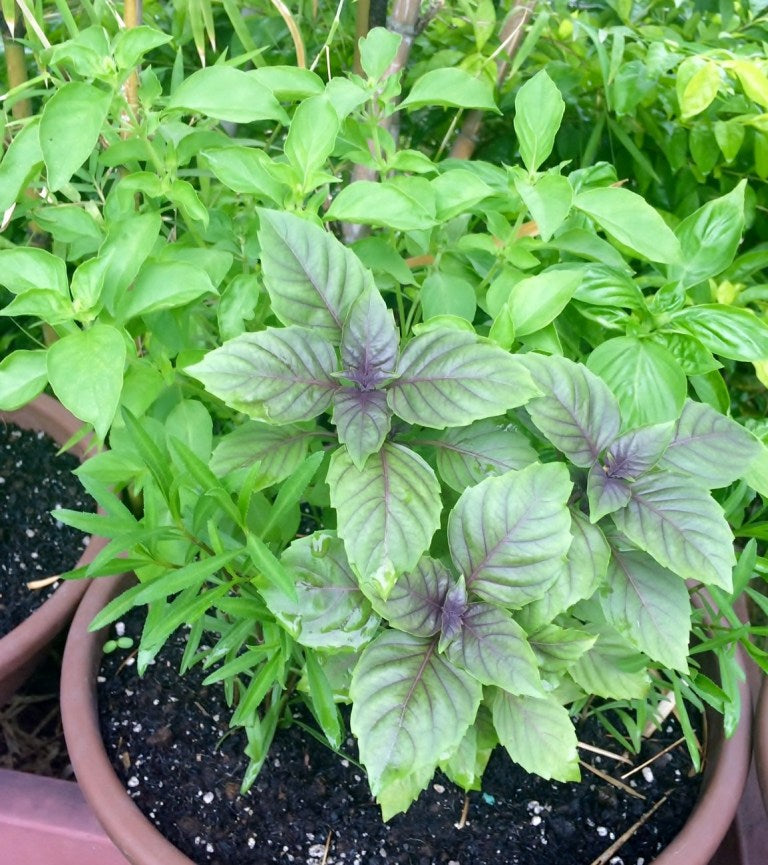
Urban Gardening 101: How to Start your Herb Garden
- Nov 26, 2016
- 0 Comment(s)
Growing herbs is perfect for starters who are challenged with limited gardening space. Most herbs can grow well in pots which makes it very easy for the urban gardeners to move them around. In my own garden, I have a variety of herbs: basil, sage, mint, peppermint, choco mint, chives, tarragon, dill, rosemary, parsley, bunching onion, Vietnamese coriander, sawtooth coriander (Mexican cilantro), thyme, oregano, stevia, parsley, cilantro and lemon balm. Most of these herbs grow well under full or partial sunshine.
CHOOSE THE RIGHT HERBS
When starting an herb garden, it is important to know which herbs grow well locally and when to start growing them during the year . Most herbs can thrive under the warm weather condition that we have here in the Philippines and they can tolerate either full or partial sunshine. Some examples of these herbs are basil, tarragon, sage, green onion, chives, mint (and all its different varieties), oregano, thyme, rosemary and lemon balm. Most of these herbs can survive our summer heat, but some will require more frequent watering when the soil gets too dry. Some herbs like rosemary however prefer dry soil conditions, since their roots tend to rot prematurely.
Some herbs grow better when the temperature is lower or the climate is colder. Examples of these herbs are parsley, dill, cilantro and celery. Normally, these herbs grow well when the temperature is between 20 – 28 degrees Celsius, typically ideal in the highlands. When the temperature gets too hot, like what we have in the city, these herbs tend to wither away and die. While I have successfully grown dill and parsley successfully from seeds, their full growth is generally inhibited by the warm weather here in the city. These types of herbs also tend to have a shorter life span of six months to less than a year when grown under warm climates.
START SMALL
One of my biggest mistakes when I was just starting in herb gardening was that I wanted to try out everything all at once. I bought all kinds of herb seeds until I realized that I just had too many unopened seed packets. I tried to plant all of them and since I was not able to give each one enough attention, most of the seedlings died. I would therefore recommend that a gardener should start with one or two herbs only. Basil and mint are usually the easiest to grow. Once you are successful with these herbs, you can expand with more herbs like sage and tarragon.
GROW HERBS FROM SEED OR SEEDLING?
The typical question I get from fellow gardeners is whether to start from a seed or seedling. For me, it’s better to start with seedlings since I had more success with them. I bought my seedlings from a local garden store. If you don’t have access to seedlings, then starting from seeds will do, except that it takes a lot longer for most herb seeds to grow until they are ready to be harvested. Here in the Philippines, the information in the seed packets is usually very limited. To learn more about a specific herb, I had to make my own research from the internet. In propagating herbs, I use the cuttings from a fully grown herb plant.
PLANT MAINTENANCE
Generally, herbs require very little maintenance. When exposed to direct sunlight, their flavor and aroma become more intense. Most herbs will benefit from regular pruning because it helps them grow more leaves. Except for sage, most herbs lose their flavor and aroma when they start to flower. Thus, to extend the harvest period of herbs, it is necessary to harvest or prune regularly. To do this, simply cut off the top two layers right before the third node. These cuttings may be dried under direct sunlight and stored for future use.
When grown in containers, it is important to use a well-draining soil. This means a good mixture of compost, coco peat and perlite. In the absence or perlite, small rocks or sand pebbles may be used to line the bottom of the pot. Fertilizers for herbs are rarely needed, but it helps to add compost to the soil at least once a month. Herbs are usually pest resistant and some can even help repel common insects. For this reason, some herbs can be a perfect companion plant for other plants.

